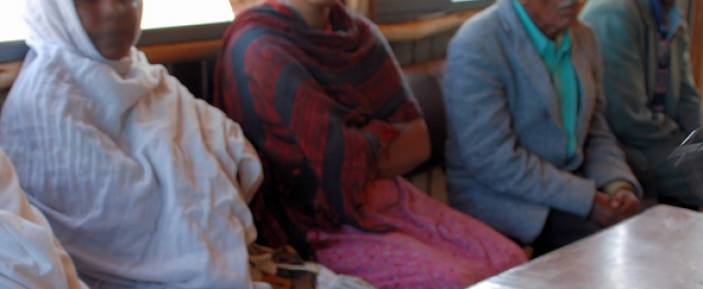This World AIDS Day, here in Kenya, we will be focusing on health services for older people paying particular attention to their experience when coming to hospital and clinics.
In Kenya there are around 1.8 million older people (aged 50+) and the percentage of them who are living with HIV is also on the increase.
How many exactly? We do not know. As older people do not perceive themselves – and are rarely perceived by others – to be at risk of HIV infection, they are hardly ever targeted during HIV testing activities. It is as if HIV disappears after 49 years of age.

But these demographic changes have a huge impact on health care provision, as both communicable (HIV and TB) and non communicable diseases (arthritis, heart conditions, diabetes, dementia) become a serious issue with ageing which needs to be addressed.
I work at Christian Community Services – a partner of HelpAge International – and during our work in Kenya, it has become very evident that older people avoid going to hospital because of stigma especially if they have to seek HIV counselling and testing services.
Older people are often uncomfortable when mixed with younger people in long queues in hospitals, and they also lack the energy and patience to attend public hospitals due to the time they have to wait.
When older people do come, they are treated with contempt by health care providers who perceive drugs used to treat older people as wasted with drugs, and time, better used to treat ‘younger more productive patients’.
Ban queues and bring in spaces for relaxation
Yet if access to health care services for older people is made easier it can be a good entry point for HIV testing and treatment alongside treatment and care for other conditions.
Therefore, it is imperative governments change the way hospital care is delivered to older adults.
Older people experience discomfort and challenges when they try to access health services in most developing countries so it is so important to provide health services to older people to meet their needs.
We have been involved with discussions with the management of Gatundu Hospital in Kenya to influence the quality of hospital service older people are receiving.
The Medical Superintendent has been very cooperative and has promised to provide a separate consultation room for older people and an after-treatment recreation lounge for hospitalized older people to reduce the time the patients spend in the ward beds, and give them time and space to relax.
The challenge we face is raising funds for furnishing the rooms.
At Gatundu we have been allowed to put a sign at the hospital entrance and all departments stating that older people should not have to queue for services in this particular hospital.
Using World AIDS Day to raise awareness of ageing
On World AIDS Day this year, we will be raising awareness and providing services to older people through a medical camp.
The key activities shall include, a procession lead by older peer educators, HIV education and experience sharing by older people living with HIV with the aim of demystifying HIV and ageing, reducing stigma and increasing HIV testing uptake among older people.
The unveiling of the sign on no queuing for older people by the District commissioner and the Medical Superintendent shall be followed by older people being taken round the hospital by the Medical Officer in charge for orientation.
The free medical camp we are running on World AIDS Day will provide testing for HIV and other conditions to about 400 older people.
Our work with Gatundu hospital will ensure many more continue to benefit from better health care in the months and years to come.
We hope others will follow suit and do the same.
What next?
- Read how HelpAge and our partners are making progress with UNAIDS on getting older people and carers included in targets and policy decisions.
- Download our Ageways magazine and find out how older people contribute to the HIV response.
- See the hurtful discrimination older people face in our Age, sex and HIV animated video
